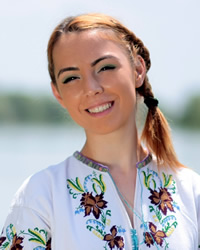There were tribal peoples living in what is now Romania thousands of years ago. Finally, they were unified under the Dacian Kingdom in the first century BC. That kingdom ended in 106AD when it was conquered by the Roman Empire, one of their eastern outposts. That is why Romanian is one of the Romance languages. The Romans retreated in the 270s under pressure from the Goths. The Roman control of the area was short-lived and Romania was isolated from other Romance languages. Many Slavic words crept into their vocabulary.
Romanians have struggled to maintain independence for centuries. They gained independence from the Ottoman Empire in 1977. The 20th century was especially difficult. They unified as a nation in 1918 as a kingdom. That kingdom was abolished in 1947. After WWII, the Soviet Union took advantage of the weakened state of Romania and other Eastern European countries that were destroyed by war. Romania was a Soviet satellite country until 1990.
Romanians live mainly in Romania, but they also live in 39 other countries, mostly in Europe. A large number live in North America, specifically Canada.
Many Romanians moved to Canada and the United States between the 1890s-1920s. Canada had the Dominion Lands Act, which encouraged homesteading new farms in their under-populated central provinces. Romanians were among those who answered the call. By 1902, they established St Nicholas's Romanian Orthodox Church for their spiritual needs.
There was another wave of Romanians fleeing a new communist government after WWII, and some now live in Canada. When Romania's communist government fell in 1989, Romanians had the chance to flee that country, and many did so.
Today, most of these Romanians are well-integrated. They hold cultural and religious festivals to stay connected with the culture of Romania.
Romanian women can take on jobs like home improvement and auto repair that are usually for men. Romanians respect their women and often give them their seat on a bus.
Bragging is a taboo; they value humility.
Romanians commonly smoke and drink, though they frown upon drunkenness. Their national drink is Tuica, made from fermented plums. Romanian cuisine is greasy and rich in meats, but they also make sure bread is on the menu.
Though Romanians are Orthodox Christians, they have maintained a number of superstitions regarding black cats, etc. In this worldview, events are determined by something other than God. There are also small populations of Roman Catholics and Evangelicals.
Romanians need a country with a strong economy. When parents have to migrate elsewhere to find work, the children suffer.
Pray for the Holy Spirit to move powerfully in Romanian churches and in their families, leading thousands to put all their faith in Jesus Christ.
Pray for Romanians in Canada to be reached with the gospel by local Christians.
Pray that soon Romanian disciples will be making more disciples.
Scripture Prayers for the Romanian in Canada.
https://en.wikipedia.org/wiki/Romanians
https://nomadnotmad.com/romanian-culture/
https://en.wikipedia.org/wiki/Romanian_Canadians
https://en.wikipedia.org/wiki/Romanian_Canadians#/media/File:Romania.750pix.JPG
| Profile Source: Joshua Project |











